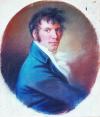Biography
Other info : Bibliography
Jens Immanuel Baggesen was a Danish poet.Baggesen was born at Korsør. His parents were very poor, and before he was twelve he was sent to copy documents at the office of the clerk of the district. He was a melancholy, feeble child, and before this he had attempted suicide more than once. By dint of indomitable perseverance, he managed to gain an education, and in 1782 entered the university of Copenhagen.
His success as a writer was coeval with his earliest publication; his Comical Tales in verse, poems that recall the Broad Grins that Colman the younger brought out a decade later, took the town by storm, and the struggling young poet found himself a popular favourite at twenty-one.
He then tried serious lyrical writing, and his tact, elegance of manner and versatility, gained him a place in the best society.
This success received a blow in March 1789, when an opera, Holger Danske, which he had written, was received with heated controversy and a nationalist reaction against him (as an associate of Germans) set in. He left Denmark in a rage and spent the next years in Germany, France and Switzerland. He married at Bern in 1790, began to write in German and published in that language his next poem, Alpenlied. In the winter of the same year he returned to his Denmark, bringing with him as a peace-offering his fine descriptive poem, the Labyrinth, in Danish, and was received with unbounded homage.
The next twenty years were spent in incessant restless wanderings over the north of Europe, Paris latterly becoming his nominal home. He continued to publish volumes alternately in Danish and German. Of the latter the most important was the idyllic epos in hexameters called Parthenais (1803).
In 1806 he returned to Copenhagen to find the young Adam Oehlenschläger installed as the great poet of the day, and he himself beginning to lose his previously unbounded popularity. Until 1820 he resided in Copenhagen, in almost unceasing literary feud with some one or other, abusing and being abused; the most important feature of the whole being Baggesen's determination not to allow Oehlenschläger to be considered a greater poet than himself. He then left Denmark for the last time and went back to his beloved Paris, where he lost his second wife and youngest child in 1822, and after the miseries of an imprisonment for debt, fell at last into a state of hopeless melancholy madness. In 1826, having slightly recovered, he wished to see Denmark once more, but died in the freemasons' hospital at Hamburg on his way and was buried at Kiel.






